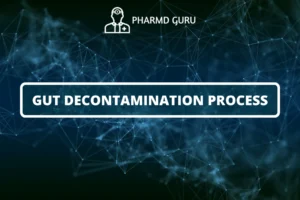CNS depressants are a class of drugs that slow down brain activity, leading to sedation, relaxation, and in higher doses, anesthesia. While these drugs have legitimate medical uses for conditions such as anxiety, insomnia, and seizures, their misuse or overdose can result in serious health complications. In this article, we will explore the introduction to CNS depressants, their mechanism of action, clinical effects, investigations, and management of poisoning/overdose.
SCROLL DOWN TO THE BOTTOM OF THE PAGE FOR ACTUAL NOTES
TABLE OF CONTENTS:
- Introduction to CNS Depressants
- Mechanism of Action
- Clinical Effects of CNS Depressants
- Investigations for CNS Depressant Poisoning/Overdose
- Management of CNS Depressant Poisoning/Overdose
1. Introduction to CNS Depressants
CNS depressants, also known as sedatives or tranquilizers, are substances that act on the central nervous system to decrease brain activity and produce calming effects. They include medications such as benzodiazepines (e.g., diazepam, alprazolam), barbiturates (e.g., phenobarbital, secobarbital), and certain sleep medications (e.g., zolpidem, eszopiclone).
2. Mechanism of Action
CNS depressants enhance the activity of a neurotransmitter called gamma-aminobutyric acid (GABA) in the brain. GABA is an inhibitory neurotransmitter that reduces neuronal activity, resulting in sedation, relaxation, and decreased anxiety.
3. Clinical Effects of CNS Depressants
The clinical effects of CNS depressants include:
- Sedation and drowsiness: CNS depressants can induce a state of calmness, relaxation, and drowsiness.
- Muscle relaxation: These drugs can cause muscle relaxation, which can be therapeutically beneficial or lead to impairment and loss of coordination in overdose situations.
- Anxiolysis: CNS depressants are commonly used to reduce anxiety and promote a sense of calm.
- Anticonvulsant effects: Certain CNS depressants, such as barbiturates, are used in the management of seizures.
- Respiratory depression: One of the most significant risks of CNS depressants is their ability to suppress the respiratory system, leading to shallow breathing or respiratory arrest.
4. Investigations for CNS Depressant Poisoning/Overdose
When managing a suspected CNS depressant poisoning or overdose, the following investigations may be conducted:
- Toxicology screening: This involves analyzing blood or urine samples to detect the presence of specific CNS depressants or their metabolites.
- Complete blood count (CBC): A CBC helps evaluate the overall health status, including red and white blood cell counts.
- Liver function tests: These tests assess the liver’s function, as some CNS depressants can affect liver enzymes.
- Electrolyte levels: Monitoring electrolyte imbalances, such as low potassium or magnesium levels, is important in managing CNS depressant poisoning.
5. Management of CNS Depressant Poisoning/Overdose
The management of CNS depressant poisoning or overdose involves the following approaches:
- Supportive care: Ensuring the individual’s airway, breathing, and circulation are maintained. Oxygen supplementation and assisted ventilation may be necessary in severe cases.
- Gastric decontamination: Administering activated charcoal or performing gastric lavage may be considered if the ingestion was recent and the individual is conscious.
- Antidote administration: In specific cases, such as benzodiazepine overdose, the reversal agent flumazenil may be used under medical supervision.
- Monitoring and treatment of complications: Close monitoring of vital signs, respiratory status, and electrolyte balance is essential. Complications, such as respiratory depression or seizures, should be promptly treated.
ACTUAL NOTES




